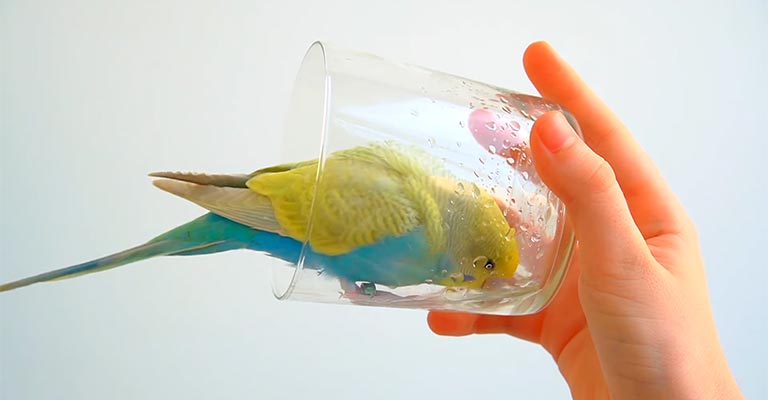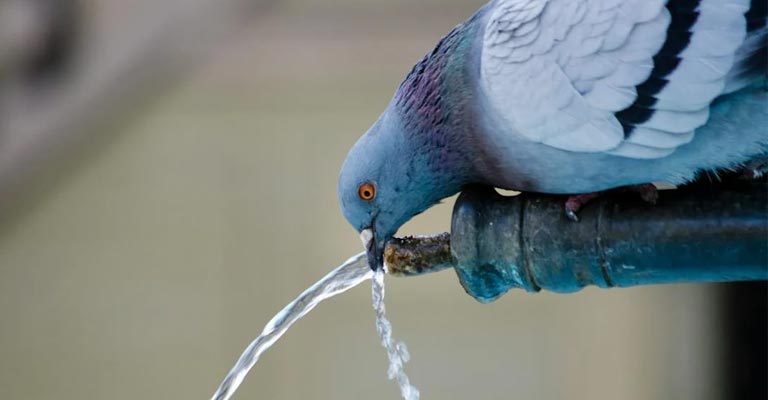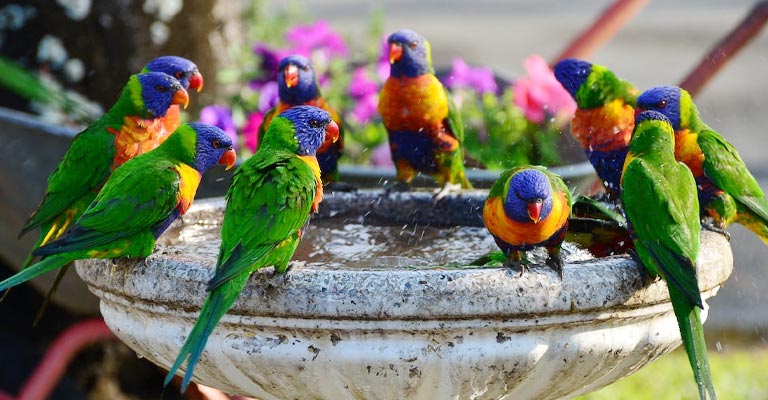Observing your bird drinking an unusual amount of water can be a cause for concern and curiosity. Birds, like all animals, require proper hydration for their well-being.
However, when they start drinking excessive amounts of water, it raises questions about their health and potential underlying issues.
Understanding why is my bird drinking so much water than usual is a critical step in ensuring its health and addressing any specific needs.
Excessive thirst in birds can be attributed to various factors, including environmental conditions, dietary choices, health problems, or behavioral changes.
Recognizing the underlying cause is essential for providing appropriate care and maintaining the overall health and comfort of your feathered companion.
This article explores the common reasons behind increased water intake in birds, shedding light on the potential issues that may need attention.

Why Is My Bird Drinking So Much Water?
Let’s discuss why is my bird drinking so much water:
Dehydration
Excessive water consumption might indicate dehydration. Birds, especially in warmer climates, increase water intake to compensate for fluid loss through perspiration and evaporation.
If your bird is drinking more water than usual, it could be trying to stay hydrated.
Dietary Factors
Birds on a high-sodium diet may experience increased thirst. Additionally, certain foods, like those with high water content, can lead to increased water intake.
Review your bird’s diet to ensure it’s balanced and free from excessive salt, which could be triggering excessive thirst.
Kidney Issues
Kidney problems can affect a bird’s ability to regulate water balance. Diseases like nephritis can cause increased water intake as the kidneys struggle to filter waste properly, leading to dehydration and heightened thirst.
Diabetes
Avian diabetes can result in excessive thirst and urination. Birds with diabetes have difficulty regulating blood sugar levels, leading to increased water intake. If you suspect diabetes, consult a veterinarian for proper diagnosis and management.
Liver Disease
Liver disorders can disrupt metabolic processes, affecting the bird’s water balance. Conditions like fatty liver disease can cause increased thirst. Liver problems often require veterinary attention for diagnosis and treatment.
Polyuria
Polyuria and excessive urination can make birds drink more water to compensate for the increased fluid loss. Identifying the underlying cause of polyuria, such as kidney issues or diabetes, is crucial in addressing the root problem.
Psychological Factors
Stress, anxiety, or changes in the bird’s environment can lead to increased water consumption. Birds may drink more water when they feel uneasy, making it essential to provide a calm and comfortable living space.
If you notice your bird drinking significantly more water than usual, consult an avian veterinarian. They can conduct tests to diagnose any underlying health issues and recommend appropriate treatments or dietary adjustments to ensure your bird’s well-being.
How Much Water My Bird Should Drink?

Here’s how much water my bird should drink:
Normal Daily Intake
Birds typically drink about 5-10% of their body weight in water daily. For example, a bird weighing 100 grams might consume 5-10 milliliters (ml) of water per day.
This is a general guideline, and individual variations in water intake exist based on species, diet, and environmental conditions.
Hot Weather
During hot weather, birds may drink more water to stay hydrated and regulate their body temperature. In scorching climates, your bird’s water intake may significantly increase.
Ensure a constant supply of fresh, clean water to help them cope with heat stress.
Dietary Factors
Birds consuming a diet high in dry seeds might drink more water than those on a balanced diet that includes fresh fruits, vegetables, and moistened pellets. Foods with high water content, like fruits and vegetables, can contribute to their overall hydration.
Egg-Laying Females
Female birds laying eggs may consume more water due to the physiological demands of egg production. Providing calcium supplements and a well-balanced diet can help support egg-laying females and manage their increased water intake.
Illness or Medication
Sick birds or those undergoing medical treatment might experience changes in water intake. Some illnesses or medications can cause excessive thirst, leading to increased water consumption.
If you notice significant changes, consult an avian veterinarian for a health check-up.
Recovery from Illness
Birds recovering from illness, dehydration, or stress might need increased water intake for recuperation. Offer electrolyte solutions or watery fruits to aid in their recovery and provide essential hydration.
Breeding Season
During the breeding season, both male and female birds may increase their water intake, especially if they are feeding chicks. Breeding birds need additional hydration to support their own needs and provide moisture to their young ones.
While these situations can influence your bird’s water consumption, it’s essential to monitor their individual needs. Regularly check their water dish, ensuring it is clean and filled with fresh water.
If you notice drastic changes in their drinking habits or suspect any health concerns, consult an avian veterinarian for proper evaluation and guidance.
How Do I Know If My Bird Is Getting Enough Water?

Here’s how do you know if your bird is getting enough water:
Monitor Water Dish
Regularly observe your bird’s water dish to ensure it is clean and filled with fresh water. A visual check can give you an idea of their water consumption. If the water level drops noticeably, it indicates that your bird is drinking.
Observe Droppings
Healthy birds maintain a balance between water intake and urination, reflected in their droppings. Normal droppings should have a white part (urine) and a green or brown part (feces).
If you notice excessively dry or hard droppings, your bird might be dehydrated.
Check Skin Elasticity
Gently pinch the skin on your bird’s back or between its shoulder blades. In well-hydrated birds, the skin should quickly snap back into place. If it takes longer to return to its normal position, it could indicate dehydration.
Assess Moisture in Food
If your bird primarily eats fruits, vegetables, or moistened pellets, assess the moisture content in their food. Wet or juicy foods contribute to hydration, and a well-hydrated bird might consume these foods readily.
Watch Activity Levels
Active birds tend to drink more water. If your bird is playful, vocal, and engages in regular activities, it’s likely to stay hydrated. Lethargy and lack of energy can sometimes be signs of dehydration.
Consider Environmental Factors
Factors like high temperatures, dry climates, or the use of heating/cooling systems can increase a bird’s water needs. During such conditions, birds may drink more to compensate for fluid loss. Ensure their environment is conducive to hydration.
Regular Weighing
Weigh your bird regularly, preferably at the same time each day. Sudden weight loss can indicate dehydration. If you notice a significant drop in weight, it’s essential to monitor your water intake closely and consult a veterinarian if needed.
By being attentive to these signs and taking proactive measures to ensure a constant supply of fresh water, you can help ensure your bird stays adequately hydrated, promoting its overall health and well-being.
FAQs
Why is my bird suddenly drinking more water than usual?
Sudden increases in water consumption may result from factors like high temperatures, dry climates, and changes in diet. These changes can lead to dehydration, prompting your bird to drink more to maintain proper hydration levels.
Could excessive thirst in my bird be a sign of illness?
Yes, excessive thirst can be an indicator of underlying health issues, such as kidney problems, diabetes, or infections. If your bird’s increased water intake is accompanied by other concerning symptoms, consult an avian veterinarian for a thorough examination.
Can dietary choices affect my bird’s water consumption?
Absolutely. Birds on a diet high in dry seeds may consume more water to compensate for the lack of moisture in their food. Fresh fruits, vegetables, and moistened pellets can contribute to hydration, reducing their need for additional water.
What environmental factors may lead to increased water intake in birds?
Factors like high temperatures, dry climates, or the use of heating or cooling systems can increase a bird’s water needs. These conditions can cause higher fluid loss, leading to increased thirst.
How can I tell if my bird’s excessive water consumption is a cause for concern?
If you notice other unusual symptoms, such as changes in droppings, skin elasticity, or activity levels, alongside increased water intake, it’s essential to consult with a veterinarian. These signs can help identify potential health issues and address them promptly.
Conclusion
In the world of avian care, monitoring your bird’s water consumption is a crucial part of responsible ownership.
While observing your bird drinking more water than usual can be a sign of concern, it also offers a valuable opportunity to address potential issues.
Environmental factors, dietary choices, health conditions, or even behavioral changes can all contribute to increased thirst in birds.
Identifying the underlying cause of excessive water consumption is the first step in providing the appropriate care and support for your bird.
By maintaining a clean and fresh water source, assessing their dietary needs, and monitoring their overall well-being, you can help ensure that your feathered friend remains happy and healthy.
If you notice significant changes in their water intake or suspect any health concerns, consulting with an avian veterinarian is the best way to address the issue effectively.